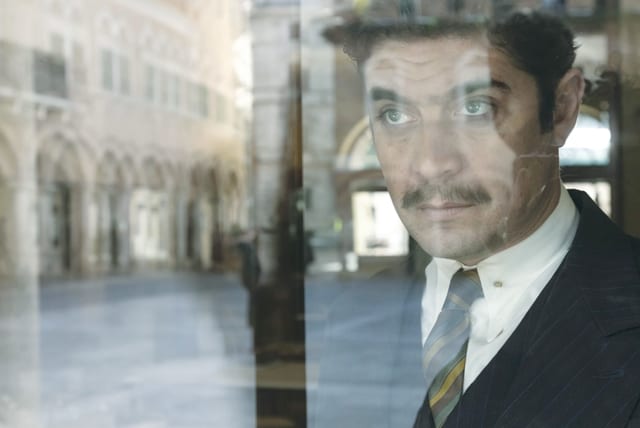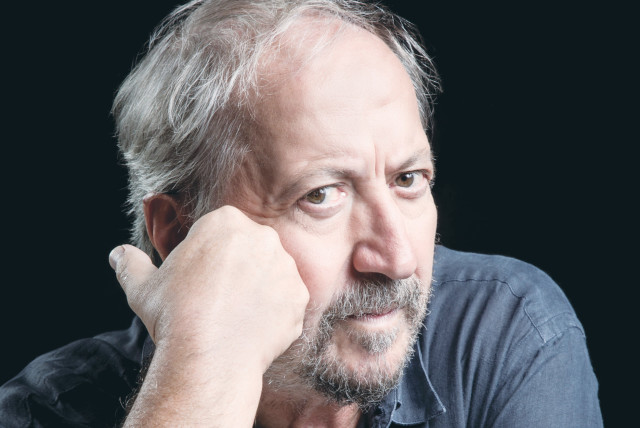New Italian film about love in fascist Italy, shows the complex lives of Italian Jews and gentiles

Director says it's time to clearly challenge issues that cause controversy, tackles the lives of people living in fascist Italy.
A new Italian film, The Shadow of the Day by Giuseppe Piccioni, which just opened the Italian Film Festival in Israel at the cinematheques in Tel Aviv, Jerusalem, Haifa, Holon, Herzliya, Sderot and Rosh Pina deals with the issue of Jews in Italy under the Fascists, through “a story of love in troubled times,” according to Piccioni.
Several past Italian films have looked at the tragedy of Italian Jews during the Holocaust, most notably, Vittorio De Sica’s classic 1970 film, The Garden of the Finzi-Continis but it’s a topic that has not been explored much in recent years. Set in the late 30s/early 40s, Shadow of the Day tells the story of a decorated veteran and hero of World War I, Luciano (Riccardo Scamarcio, one of Italy’s leading actors), who was badly wounded and walks with a limp. He runs a restaurant in a small town as if it were a military operation but there is a sense that he isn’t really quite there.
He seems to sympathize with the Fascist regime but he is not a member of the party and he is cordial with the local Fascist leader (Lino Musella), who uses Luciano’s restaurant for many events. When the kitchen staff members joke about politics, he reprimands them severely, even threatening to fire them if they do this again but he doesn’t report them to the authorities, which he could easily have done. He seems more concerned with getting through each day than anything else.
Everything changes when a young woman arrives, begging him for work. She says her name is Anna (Benedetta Porcaroli) and is willing to do anything in the restaurant, although he quickly realizes she is educated. Like him, it is clear she is holding something back. We soon learn that she is Jewish and due to the racial laws that were passed in 1938, is not allowed to study in the university or hold a job in most professions. Relationships between Jews and gentiles were forbidden, as well.
Luciano still cares about his ex, who left him when he went off to war and is now a party girl of sorts but he finds himself falling hard for Anna. When he learns her secret, he is taken aback and almost ignores it. For him, somehow, she is still Anna. But when a young Jewish man shows up, who turns out to be her husband, Emile (Wael Sersoub), and is on the run from the regime, things get very complicated.
It was before the Nazis adopted the Final Solution and it takes place in a society where Jews were relatively well integrated into the population and the public did not seem eager to kill or expel them. In the end, between 7,000 to 8,000 Jews in Italy were killed in the Holocaust but the majority survived, unlike in many other countries.
Variety of responses to fascism
THE MOVIE presents a portrait of Fascist Italy that shows the variety of responses to the regime, from active collaborators and Fascists to those who, like Luciano, prefer not to look too deeply into the shadows. He looks out the window at schoolgirls doing dance routines on roller skates for the Fascist authorities and smiles. “He is not a Fascist, he is a war veteran but the Fascists look at him in a friendly way,” said Piccioni. “He seems to see a peaceful future. But then along comes this woman with her secret and she will change his life.”
Piccioni said that many Italians did not pay much attention to the anti-Jewish so-called racial laws that were announced in 1938 and that there was little public opposition. Luciano tells Anna, who admits her real name is Esther, that the laws are not really that bad, not like in Germany, and she responds, “It’s not so bad but we lost our house and I can’t study in a university and my parents have lost everything.”
Like many Italians in that period, Piccioni said, Luciano thought a full-scale war could be avoided and that the Fascist era “was like a long, sunny day for Italy.” Through Anna, Luciano begins to question his perceptions and soon, it is clear he will never look at the world in the same way again. “He understands that something doesn’t work in his world; he has to make a choice and he decides to be human. He does it because of his love for Anna.”
Piccioni said that he conceived of a love story like this taking place in a single location, the restaurant, almost like a play. “It’s in a small town, where everyone knows everyone, everyone has his place, that was more intense than it would have been in a big city, like Rome.” The intense emotions and conflicts in the story, he said, “play out like classic tragedy.”
Piccioni wrote the script with Gualterio Rosella and Annik Emdin, and they worked to mix the personal and political stories as seamlessly as possible.
Working with the actors was a pleasure for Piccioni, who made the movies These Days (2016), Light of My Eyes and Not of This World (1999). “I am the kind of director who loves to work very much to work with actors. They knew that and they wanted to work with me. It was interesting with Riccardo. At the beginning of his career, he was a sex symbol and now, he is looking for roles where he can show more depth.”
Piccioni feels that this story is especially relevant in the turbulent political and social climate today, “with the war in Ukraine and the pandemic, I feel this is a time when we need to speak clearly about the issues that cause controversy... This is a love story but not a simple story, not only a love story.”
Jerusalem Post Store
`; document.getElementById("linkPremium").innerHTML = cont; var divWithLink = document.getElementById("premium-link"); if (divWithLink !== null && divWithLink !== 'undefined') { divWithLink.style.border = "solid 1px #cb0f3e"; divWithLink.style.textAlign = "center"; divWithLink.style.marginBottom = "15px"; divWithLink.style.marginTop = "15px"; divWithLink.style.width = "100%"; divWithLink.style.backgroundColor = "#122952"; divWithLink.style.color = "#ffffff"; divWithLink.style.lineHeight = "1.5"; } } (function (v, i) { });

